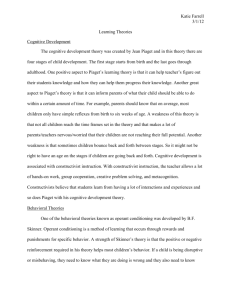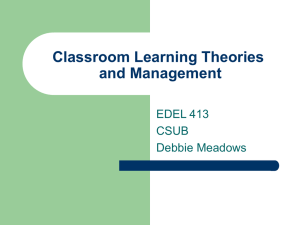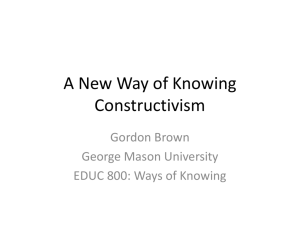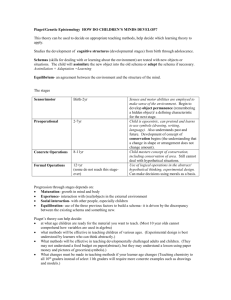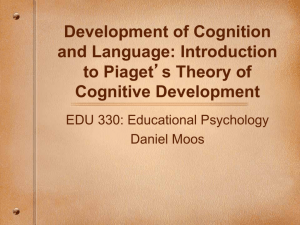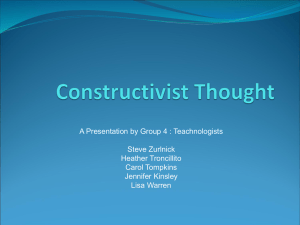Constructivism Theories of Learning: Piaget & ICT
advertisement
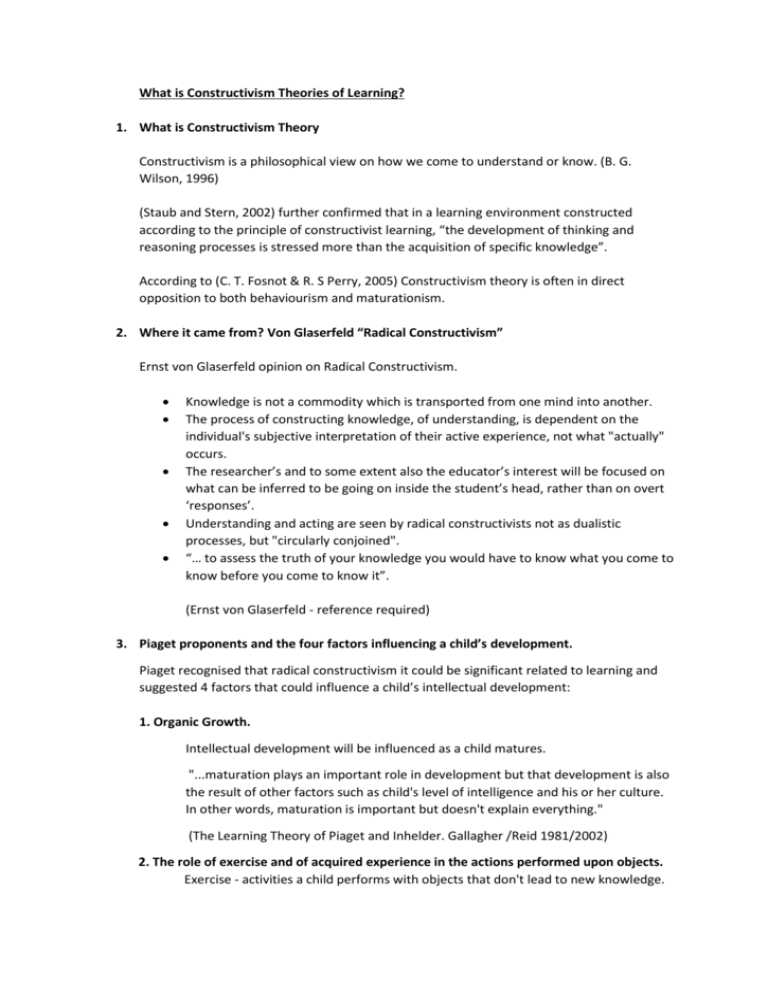
What is Constructivism Theories of Learning? 1. What is Constructivism Theory Constructivism is a philosophical view on how we come to understand or know. (B. G. Wilson, 1996) (Staub and Stern, 2002) further confirmed that in a learning environment constructed according to the principle of constructivist learning, “the development of thinking and reasoning processes is stressed more than the acquisition of specific knowledge”. According to (C. T. Fosnot & R. S Perry, 2005) Constructivism theory is often in direct opposition to both behaviourism and maturationism. 2. Where it came from? Von Glaserfeld “Radical Constructivism” Ernst von Glaserfeld opinion on Radical Constructivism. Knowledge is not a commodity which is transported from one mind into another. The process of constructing knowledge, of understanding, is dependent on the individual's subjective interpretation of their active experience, not what "actually" occurs. The researcher’s and to some extent also the educator’s interest will be focused on what can be inferred to be going on inside the student’s head, rather than on overt ‘responses’. Understanding and acting are seen by radical constructivists not as dualistic processes, but "circularly conjoined". “… to assess the truth of your knowledge you would have to know what you come to know before you come to know it”. (Ernst von Glaserfeld - reference required) 3. Piaget proponents and the four factors influencing a child’s development. Piaget recognised that radical constructivism it could be significant related to learning and suggested 4 factors that could influence a child’s intellectual development: 1. Organic Growth. Intellectual development will be influenced as a child matures. "...maturation plays an important role in development but that development is also the result of other factors such as child's level of intelligence and his or her culture. In other words, maturation is important but doesn't explain everything." (The Learning Theory of Piaget and Inhelder. Gallagher /Reid 1981/2002) 2. The role of exercise and of acquired experience in the actions performed upon objects. Exercise - activities a child performs with objects that don't lead to new knowledge. Physical experience - activities a child performs with objects that DO lead to new knowledge. Logico-Mathematical Experience - The indirect knowledge gained from activities with objects and reflecting on them. (The Learning Theory of Piaget and Inhelder. Gallagher /Reid 1981/2002) 3. Social interaction and transmission. "gained by interaction with people and includes social relationships, education, language and culture." (The Learning Theory of Piaget and Inhelder. Gallagher /Reid 1981/2002) 4. Equilibration. The organisation of the other 3 factors into a coherent whole (Piaget 1970b) (Piaget and Inhelder. Gallagher /Reid 1981/2002) Development of knowledge as a sequence of successfully improving forms of equilibrium (Webb 2013. Piaget 1978 p178-184 Development of Thought). Piaget level of equilibrium 1 - between the subject's mental schemes and external objects Piaget level of equilibrium 2 - between mental sub schemes co-ordinated into an overall scheme Piaget level of equilibrium 3 - differentiation and integration of schemes or systems into a total system of knowledge, qualitatively different from parts Process to reach equilibrium. Jean Piaget (1952; see also Wadsworth, 2004) Assimilating the outside world to fit existing schema. Disequilibrium, outside world contradicts existing schema. (?) Equilibrium, the schema evolves to reconcile with outside world. Reference: http://www.simplypsychology.org/piaget.html 4. Relation to ICT, computational thinking and Critical Thinking • • • Children construct their own knowledge in response to their experiences. Children learn many things on their own without the intervention of older children or adults. Children are intrinsically motivated to learn and do not need rewards from adults to motivate learning. Constructivism theory of learning create an atmosphere where learning ICT general principles are permitted From students perspective, this approach facilitates learning and sharing among peers Students are naturally build as computers system, therefore reproducing the same model into student mind will be an easy process Linkage of ICT to Constructivism It constitutes a shift from Teacher centred to Learner centred pedagogy Decreases memorization and rote learning Increases critical for learners ICT encourages activities in small groups of learners also the pace of these activities are determined by learners ICT enhances integrative learning that is transforming theories into practice Reference: http://www.slideshare.net/vudeevudee/ict-and-constructivism References at end Bibliography at end of slides (NO TIME ! to be collected later). Reference: The Children's Machine. Rethinking School In The Age of The Computer. Seymour Papert. 1993 5. Topics in CS/IT that could be taught with Constructivist theories of learning. Digital literacy (using ICT equipment: computers, laptop, iPad, projectors): Programing: by definition programs use algorithms and it is known that for a given problem there may be multiple algorithm that can provide the solution Web design 6. Personal theories of learning and its relation to Constructivists theories of learning. Learning should be acquired through a combination of different teaching methods including (but not limited to) constructivism. Other methods such as social cultural and situated learning theories are also keys in the learning process. The Collaborative and Acquired Experience areas of constructivist theory are particularly relevant to areas around programming and problem solving. This further suggests that pupils will benefit from the move from teacher led lessons to learner led pedagogical approaches.
